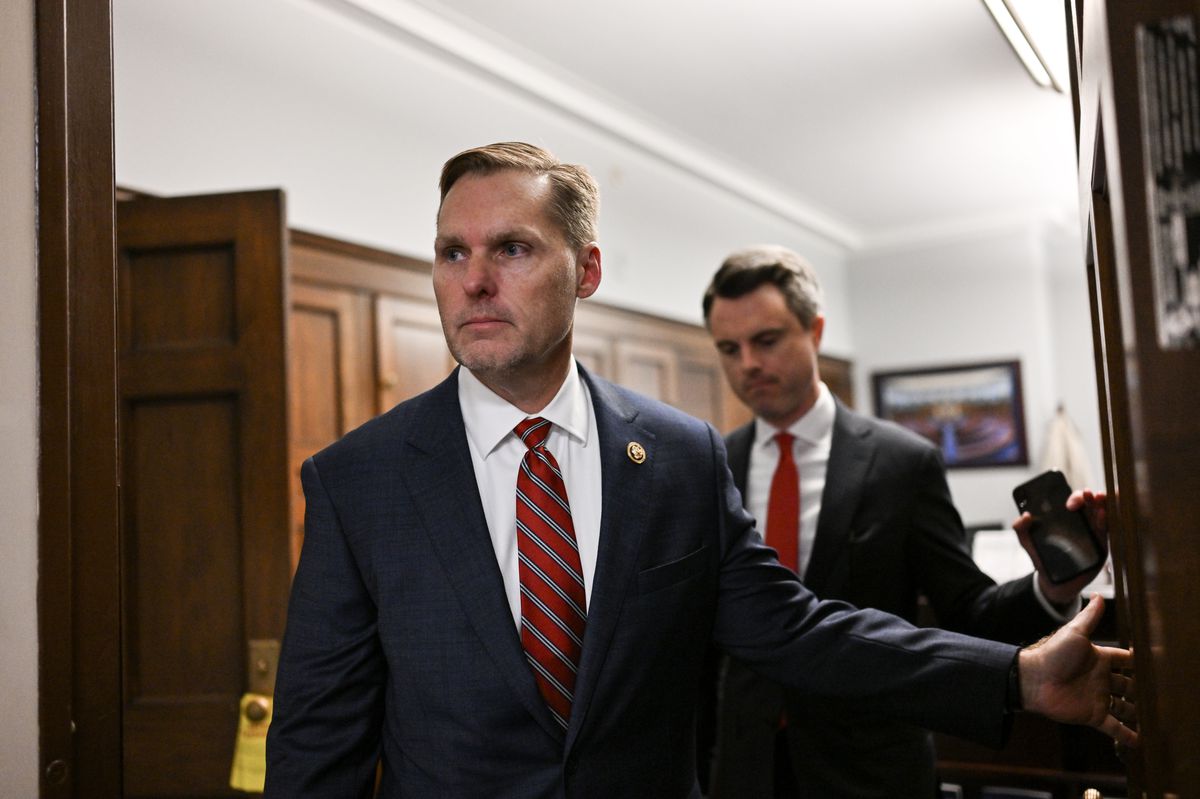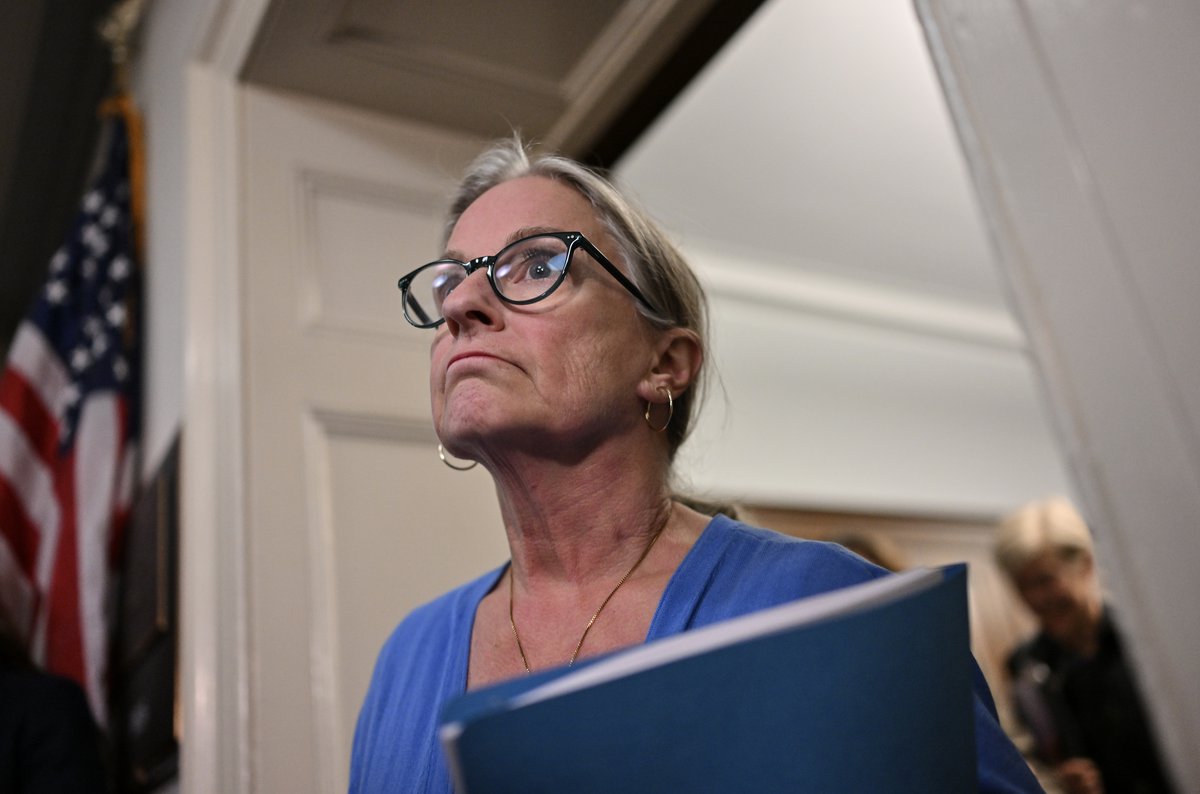

Top: House Ethics Committee Chair Michael Guest (R-Mississippi) leaves a closed-door meeting on Wednesday on whether to release the Gaetz report.
Bottom: Susan Wild (D-Pennsylvania), ranking Democrat on the House Ethics Committee, talks to reporters on Wednesday.
17:21 JST, November 24, 2024
Last December, Rep. Michael Guest (R-Mississippi) walked down the House steps to explain why he went the extra mile to lead the expulsion of the disgraced George Santos from the House.
The House Ethics Committee issued a report showing the New York Republican’s history of lies and financial deception but stopped short of recommending specific punishment. “That almost would have been a dereliction of my duty if I did not support this – if all we did was issue this report and then, you know, the Ethics Committee stays in the background,” the committee chair told reporters on Dec. 1.
Instead, on his own, Guest filed a motion to expel Santos and, with support from every Democrat on the committee, gained large bipartisan support in a 311-114 vote, making Santos just the third House member expelled since the Civil War.
Nearly a year later, the committee is back in the spotlight for all the wrong reasons.
The investigation into former congressman Matt Gaetz (R-Florida) opened up questions about the panel’s independence from political pressure, which is considered central to its role as the internal affairs unit of the House.
After Gaetz got briefly picked to become attorney general, House Speaker Mike Johnson (R-Louisiana) led a public effort to pressure Guest and the other four Republicans on the panel to bury their probe into allegations regarding payments for sex and the use of illicit drugs.
Johnson contended, despite several historical precedents, that because Gaetz had just resigned, the committee could not release any details of the investigation.
Of course, Gaetz did not skip town entirely.
When the House Ethics Committee gathered Wednesday afternoon to consider its next steps, Gaetz was across the Capitol, holed up in a small conference room off the Senate floor, trying to persuade GOP senators to confirm him as the nation’s chief law enforcement officer.
Once the more than two-hour meeting ended, the committee fractured in a way that rarely appears in public.
Rep. Susan Wild (Pennsylvania), the top Democrat, walked out into a wall of media cameras as reporters shouted questions at her, refusing to say anything.
A few minutes later, Guest walked into the same crush of media and answered a few questions, trying to not say much yet also implying that the case was closed.
“There was not an agreement by the committee to release the report,” the Republican said.
He suggested that other regularly scheduled meetings would happen through the remainder of the year, declining questions about whether the Senate Judiciary Committee could see the investigation’s conclusions.
“I said there was not an agreement by the committee to release the report,” he said.
That suggestion infuriated Wild, who narrowly lost reelection in a brutal campaign with about $36 million in advertising from all sides. She rushed back to the media maelstrom to announce that the issue had come to a deadlocked vote behind closed doors and would continue to be considered next month.
“He has implied that there was an agreement of the committee to not disclose the report. That is untrue,” Wild told reporters, suggesting Guest “betrayed the process by disclosing our deliberations.”
This type of back-and-forth is commonplace on other House committees, but not on Ethics, which has long been evenly divided between five Republicans and five Democrats, regardless of which party holds the majority.
Former Ethics members did not like Johnson publicly declaring he would “strongly request” that Guest shut down the probe without any material even being viewed by senators.
“I don’t think Speaker Johnson did anybody any favors by running his mouth and saying this shouldn’t go public. You know, when I got appointed to this committee, the only thing John A. Boehner ever asked me to do is just make sure the committee functions. That’s it,” former congressman Charlie Dent (R-Pennsylvania), who spent eight years on the committee, said Thursday in a CNN appearance.
Gaetz’s withdrawal from consideration Thursday, in part because he demonstrated a lack of understanding of how the Justice Department worked, gives a temporary reprieve to Guest, Wild and the rest of the committee. Their Dec. 5 meeting will come without the pressure of a Cabinet post hanging in the balance as the controversial Gaetz returns to life as a private citizen.
But the House panel must figure out how to reclaim its independence and forge trust between the two sides.
Minority Leader Hakeem Jeffries (D-New York) must choose another Democrat to replace Wild. Guest has also served six years on the committee, the usual limit for a term, so Johnson could replace him and appoint a new chair early next year.
Guest’s close friends view him as a trusted, behind-the-scenes lawyer who is most happy taking the tasks that do not bring much attention, someone not suited for the partisan showdowns that someone like Gaetz lived for on the House floor or on cable news.
“He’s got a servant’s heart and he will take the job no one else is willing to do,” said Rep. Kelly Armstrong (R-North Dakota), who was first elected in the same 2018 class as Guest and served two years with him on Ethics.
Most committee members have legal backgrounds, and Guest spent more than two decades in a local district attorney’s office prosecuting capital murder cases. Wild was partner at a Lehigh Valley law firm, specializing in medical malpractice, and became the Allentown solicitor in 2015, before also winning her House seat in 2018.
Guest and Wild have seen some high-profile cases, such as Santos’s and Gaetz’s, and also more nettlesome actions like enforcing rules of wearing masks on the House floor and the requirement of passing through security mags before walking onto the chamber floor for almost two years after the Jan. 6, 2021, attack on the U.S. Capitol.
Those pandemic-era rules drove the committee into fits. Many Republicans viewed the mask rules as a violation of their personal freedom, while Democrats considered it a medical necessity, and GOP lawmakers considered the security checks an overreaction to the insurrection.
Guest and Wild got promoted to the top posts late in 2022, after Rep. Jackie Walorski (R-Indiana) died in a car crash and Rep. Ted Deutch (D-Florida), then the committee chair, resigned.
Armstrong credited those top committee leaders for keeping the peace on the committee and avoiding having it turn into open political warfare, noting that a sense of trust remained when he left the panel two years ago.
“The committee survived that,” Armstrong said.
Then came the Santos and Gaetz investigations, putting the panel into an uncomfortable spotlight.
With Santos, the panel remained unified. The committee forged ahead even as the Justice Department ran a separate criminal probe, concluding the investigation a year ago. It outlined a collection of criminal fraud regarding campaign finances and financial disclosure forms filed with the House.
The committee sent its findings to Justice Department investigators and informed the public that “Santos’ conduct warrants public condemnation, is beneath the dignity of the office, and has brought severe discredit upon the House.”
One committee member, Rep. Michelle Fischbach (R-Minnesota), opposed Guest’s motion to expel Santos, but the committee voted unanimously to expose Santos’s misdeeds to the full House.
“We felt it was important that the information that we had compiled, the report, be sent to the body as a whole so that then they can make a finding,” Guest said last December.
With Gaetz, things seemed headed in a similar direction.
After initially standing back while the Justice Department investigated, the Ethics Committee kick-started its own probe in early 2023. In June, Guest and Wild released a remarkably detailed update noting allegations that Gaetz engaged in “sexual misconduct and illicit drug use, accepted improper gifts, dispensed special privileges and favors to individuals with whom he had a personal relationship.”
The investigators stayed quiet during the political campaign season but appeared ready to come down against Gaetz in some manner this month or early next month.
Then came Gaetz’s resignation, brief potential nomination and Johnson’s intervention.
Dent, who was appointed chair in 2014 by Speaker John A. Boehner, also served on the committee during the speakerships of Nancy Pelosi (D-California) and Paul D. Ryan (R-Wisconsin). He said none of them ever attempted what Johnson did in broad daylight.
“I never was involved with any of them ever trying to interfere with any type of an investigation,” he said.
Top Articles in News Services
-

Survey Shows False Election Info Perceived as True
-

Hong Kong Ex-Publisher Jimmy Lai’s Sentence Raises International Outcry as China Defends It
-

Japan’s Nikkei Stock Average Touches 58,000 as Yen, Jgbs Rally on Election Fallout (UPDATE 1)
-

Japan’s Nikkei Stock Average Falls as US-Iran Tensions Unsettle Investors (UPDATE 1)
-

Trump Names Former Federal Reserve Governor Warsh as the Next Fed Chair, Replacing Powell
JN ACCESS RANKING
-

Producer Behind Pop Group XG Arrested for Cocaine Possession
-

Japan PM Takaichi’s Cabinet Resigns en Masse
-

Man Infected with Measles Reportedly Dined at Restaurant in Tokyo Station
-

Israeli Ambassador to Japan Speaks about Japan’s Role in the Reconstruction of Gaza
-

Videos Plagiarized, Reposted with False Subtitles Claiming ‘Ryukyu Belongs to China’; Anti-China False Information Also Posted in Japan






















